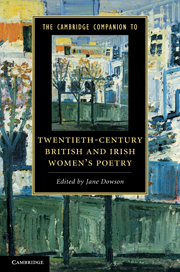Book contents
- Frontmatter
- 1 Introduction
- 2 Post/Modernist rhythms and voices: Edith Sitwell and Stevie Smith to Jo Shapcott and Selima Hill
- 3 Reframing women’s war poetry
- 4 Verbal and visual art in twentieth-century British women’s poetry
- 5 Towards a new confessionalism
- 6 The mid-Atlantic imagination: Mina Loy, Ruth Fainlight, Anne Stevenson, Anne Rouse and Eva Salzman
- 7 The Irish history wars and Irish women’s poetry: Eiléan Ní Chuilleanáin and Eavan Boland
- 8 Interculturalism: Imtiaz Dharker, Patience Agbabi, Jackie Kay and contemporary Irish poets
- 9 Post-pastoral perspectives on landscape and culture
- 10 Feminism’s experimental ‘work at the language-face’
- 11 Carol Ann Duffy, Medbh McGuckian and ruptures in the lines of communication
- Selected reading
- Index
11 - Carol Ann Duffy, Medbh McGuckian and ruptures in the lines of communication
Published online by Cambridge University Press: 28 May 2011
- Frontmatter
- 1 Introduction
- 2 Post/Modernist rhythms and voices: Edith Sitwell and Stevie Smith to Jo Shapcott and Selima Hill
- 3 Reframing women’s war poetry
- 4 Verbal and visual art in twentieth-century British women’s poetry
- 5 Towards a new confessionalism
- 6 The mid-Atlantic imagination: Mina Loy, Ruth Fainlight, Anne Stevenson, Anne Rouse and Eva Salzman
- 7 The Irish history wars and Irish women’s poetry: Eiléan Ní Chuilleanáin and Eavan Boland
- 8 Interculturalism: Imtiaz Dharker, Patience Agbabi, Jackie Kay and contemporary Irish poets
- 9 Post-pastoral perspectives on landscape and culture
- 10 Feminism’s experimental ‘work at the language-face’
- 11 Carol Ann Duffy, Medbh McGuckian and ruptures in the lines of communication
- Selected reading
- Index
Summary
Eight months before her announcement as Britain’s first female Poet Laureate, Carol Ann Duffy’s ‘Mrs Schofield’s GCSE’ was first published on the front page of the Guardian for Saturday, 6 September 2008 amid considerable notoriety. Under the broad banner-headline, ‘Poet’s rhyming riposte leaves Mrs Schofield “gobsmacked”’, Ester Addley reported on the attempt by Pat Schofield, an examiner in Leicestershire, to have the Academic Qualifications Authority (AQA) remove an anthology of poetry from its GCSE (General Certificate, Secondary Education) curriculum because one of its selections, Duffy’s dramatic monologue ‘Education for Leisure’, ‘supposedly glorified knife crime’. Duffy’s ‘riposte’ to the censorship advocated by Schofield comprises another dramatic monologue in the ‘thrown voice’ of an examiner who, in an opening octave, sets a sequence of tightly interlaced quotations from Shakespearean drama and questions about the import of literal and metaphorical ‘knife crimes’:
You must prepare your bosom for his knife,
said Portia to Antonio in which
of Shakespeare’s Comedies? Who killed his wife,
insane with jealousy? And which Scots witch
knew Something wicked this way comes? Who said
Is this a dagger which I see? Which Tragedy?
Whose blade was drawn which led to Tybalt’s death?
To whom did Caesar say Et tu? And why?
- Type
- Chapter
- Information
- Publisher: Cambridge University PressPrint publication year: 2011
- 1
- Cited by



